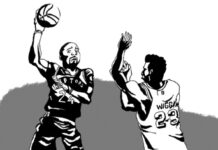Graduation is fast approaching, and it can be an exciting and nerve-racking time for many students at UW, who are often looking to secure a job and figure out their future. Everyone has their own unique journey at university, and we can gain insight from each experience.
Rania Atif, Honours Arts and Business
Rania Atif is in the honours arts and business program, majoring in legal studies. She is graduating this April and has mixed feelings about it, adding that she feels pretty nervous because of the state of the economy. “I am grateful for co-op and having some experience from that, but to be honest, UW doesn’t really instill you with the knowledge you need to go out in the business world,” she said, expressing that her co-op term would have been more beneficial with valuable courses like data analysis, instead of PD.
Atif started her undergraduate degree as an economics major, but didn’t enjoy it because of the professors and online classes. She later realized that studying law was her passion, and switched to legal studies. “I was so happy when I switched because I got better co-ops and the professor was very resourceful,” she said.
During her university career, Atif worked co-op jobs at CIBC, Manulife, and UW. Atif expressed that she had a difficult time in her first co-op at Manulife, as it was entirely remote. After that, she worked for the UW international student experience team. Of this co-op, she said, “This job didn’t really add anything to my resume and I felt like I wasn’t recognized for the work I did.” She then worked at a small law firm, where she reviewed refugee cases and wrote legal papers regarding the protection of refugee women that were shown to federal courts. Atif’s last co-op was with CIBC, where she updated a lot of the existing systems in the financial crime and risk management department. She appreciated working with CIBC and hopes to go into banking post-graduation.
“This co-op was my favourite, because I got to present my projects to the Chief Risk Officer and other senior executives,” she said. Atif added that students who are having a hard time finding co-op can expand their technical skills by doing Excel courses or learning a coding language.
When asked about her outlook on the university, Atif stated, “My time at the university was challenging and character building.” Atif explained how she wished she’d had more faith in herself. “ I wish that I didn’t let imposter syndrome choose my major at the start and just went into legal studies. I am genuinely so passionate about legal studies and wished I had chosen it earlier,” she said. Atif is encouraged by how many roles are available in the financial crime industry, especially given that the industry is “very new, and is considered a booming industry because it’s very common.”
AJ Mbobi, Honours Science
AJ Mbobi is in his last year of the honours science program with a minor in geography and environmental sustainability and will be graduating in April. For the past three years, he has looked forward to graduating, however, the reality is settling in now. “Now that I am two months out, I am realizing that education is pretty much all I have known,” he said. Mbobi mentioned how he wasn’t ever in the co-op program, so he hasn’t had a straight nine-to-five schedule for more than a month. He is scared about going into the real world, but takes solace in the fact that he won’t be attending school.
When asked about job prospects, Mbobi mentioned he had an interview last week for ONroute Ontario, a Canadian service company that operates highway rest stops. He said, “ I managed to get to the third stage of the interview process, however, there was only one position available, and the chances of getting hired are really low… it might not just be that I am not necessarily a good candidate, just not the best candidate for that job.”
Mbobi explained how during his first year at the university, he felt a big sense of community because he lived in an on-campus residence. After the COVID-19 lockdown, he felt isolated and didn’t feel like he got all the support he needed from the university. “The six free therapy sessions per term did help me through the lockdown, so I have to get them some credit,” he said. After lockdown, he felt students were less likely to talk to one another, especially the newer students. However, he thinks that clubs did help bring back the sense of community.
Mbobi expressed that his industry, climate science, has a sense of “boomerism.” He explained that we can do all the science in the world, but it all depends on policy makers to reduce our impact on the global climate. He said that “there is the bleakness of it, but at the same time, all climate scientists love their work because they are working where they love, which is out in nature.”
When asked about doing anything different in his undergraduate years, he responded by saying that he wished he didn’t go into the honours science program because of the lack of community and connection. “To navigate university, you need a good support system, and that includes students who are in your classes on a regular basis,” he said. “Honours science didn’t provide that.”
Laura Steiner, Honours Arts
Laura Steiner is in the honours arts program, majoring in psychology and minoring in social developmental studies. She said that she is “having mixed feelings about graduating, and [is feeling] scared and excited at the same time.” She has a job lined up after graduation as a physician navigator at Southlake Regional Health Centre in Newmarket.
Steiner explained how after COVID-19, she has grown to love Waterloo, and never really ran into a bad professor. “All the professors go above and beyond to make sure that we feel comfortable and to ensure that there are resources for us,” she said.
While not in the co-op program, Steiner applied for jobs every summer. She was recommended a job by her academic advisor as a personal support worker role, applied, and accepted their offer. “I love the job and I spend the day with a man who has a developmental disability. My goal is to make his life more productive and keep him busy,” she said. There is a demand for the job she is going into, she said, so that hospitals and emergency rooms run more efficiently. After this job, she plans to get her masters in occupational therapy.
Reflecting on what she would have done differently in her undergraduate years, she wished that she reached out more to meet people and had contacted the school to host some sort of orientation, since she started her first year amid the COVID-19 pandemic.































